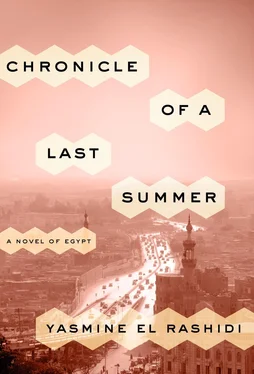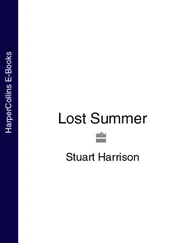I gazed at Uncle and Mama that day and wondered about fate. Could I build all this into what I’m writing, my script, the eventual film? I want to do something different, merge forms, speak to people on the street about their desires, and also capture this internal life, the intimate moments at home, the mundane. How did we land in our lives? The silence and the evenings in front of the TV are as comforting as they are fraught. In my mind’s eye I envisage Baba, his absence ever present in the questions unasked. Even Dido and I don’t talk about it, though we talk about everything else. I imagine the questions linger for everyone. There had been problems with the government. They were selective about who they went after. It is all I know. It might be all anyone knows, even Baba himself. In ways I understand what Dido means when he says it should be the source of my anger, that my placid exterior is a mask. An arbitrary system is an unjust system, he says. Or maybe it’s no system at all. Maybe H can play the main protagonist, enacting parts and playing herself in others. Maybe she’s right that I should just write a book.
Mama has her hands crossed on her chest. She sits upright, as if watching and listening intently. An advertisement for Al Jawhara tea. Three men sit at a café playing backgammon. Two wear safari suits. One is in a gold-threaded galabia. Colored tea lights are strung across an alley. As they play, they begin to slouch into their chairs. One man nods off into sleep. Enter the belly dancer. Singing, dancing, a tray of glasses with tea balanced on her hand. Her body writhes. The café is suddenly packed. The men perk up. They dance around her. Uncle’s face is blank.
Part Three: Summer 2014, Cairo
The cleaning lady found Uncle in bed one morning a few months before the revolution. His coffee was untouched. Biscuit crumbs were on his bedcover. He was sitting upright, holding the newspaper, not moving. They said it was a heart attack, high blood pressure. The last time I had seen him was on the Sunday after they pulled down the church. He came with three newspapers and rang the bell insistently. I stuck my head out of the window ready to shout. Young boys were always ringing our bell and running away. I saw Uncle’s bald head and went down to greet him. We went up the back stairs together. He put one hand on the banister and hauled himself up. I could hear his breath getting heavier ahead of me. He asked if Mama was home. Mama was always home in the mornings. Some days she wouldn’t come out of her bedroom until noon. Uncle paused at the first floor and peered in. Each time he came, he would say that he hadn’t been downstairs since Granny died. I would tell him to come, look . He would shake his head, pat my shoulder, look up at the stairs ahead of him, and tell me that it was better this way. Some memories need to be preserved. He didn’t want to write over them with something new.
I was living downstairs by then. I slept in the room where Granny and Nesma had lived and died. Their things were in storage in the basement, except for Granny’s bed, which was now in Mama’s room, the same room she was born in. We went up to Mama’s floor. I put my key in the door and coerced it until the lock turned. All the locks in the house had problems. Some of them opened backwards, others jammed. Mama refused to change them. She worried the locksmith would change the lock and keep a copy of the keys for himself. I had become skeptical like her. Everyone would cheat you. Uncle would say that corruption and thievery were what made the country. Without those things it would fall apart. A low-lying level of corruption was critical, something like oil on a machine. Dido and he argued about this endlessly. Dido had paced the room the last time it came up, not long before Uncle died. He was adamant. He didn’t participate in this insidious corruption. Anarchy was better. Uncle asked him. Did he tip the parking attendant? The man who helped with his papers at the Mugamma? Dido gestured with his shoulders and hands as if to say, Ridiculous question. Uncle laughed. Dido barked back that it was culture not corruption. He was part of a movement that would take to the streets chanting about being fed up with the status quo. Kifaya, it’s enough. He had tried repeatedly to get me to go with him to the marches, to make a film called Kifaya. I promised I would go one day, but just not that day. Every few weeks he would try again, but I knew that deep down he knew. Activism was in the genes, and if not, it came from upbringing. We are informed by the experiences and behaviors of those around us. Dido loved me, but when he said these things, I could feel his disappointment. I knew I lacked the gene. I was more interested in abstracting experience with my writing and films than representing it. Unless it was the mundane, like a nine-minute short I filmed in a record store downtown. The owner was wary at first. He asked who I was making a film for. Why was I making a film? Who would see it? What would I do with it? Why his shop? He said I could film, then changed his mind. I showed him other films I had made. I went to him again. Again. We drank tea. Eventually he agreed. I filmed. Hours of B roll. A customer comes in with a CD he has bought of Umm Kulthum. He tells the shop owner to go to the second song. He asks him to listen. The song is one hour and forty-four minutes long. It happens in minute twenty-three. The quality isn’t what it should be. He knows Umm Kulthum, and her voice doesn’t crack like it does here. They listen. She is singing at a decibel higher than she should. It lasts a second, maybe it’s intentional? It’s a crack, she lost control. But she never lost control. Is it age? Was it? It’s just a bad recording? It is a bad recording. It must be. They call a man walking by from off the street. What does he think? The café owner next door. The bawab of a building across the alley. Does her voice crack? This is her most famous concert, it can’t be. They play minute twenty-three over and over. They turn to me and ask what I think. In my mind I think that I can just sit there for hours, camera on, listening like them. This was what Dido had meant about placid, I thought.
Uncle had walked into the house and collapsed onto the sofa. He asked me for a glass of water or something fizzy. There was no sign of Mama. He put his neck back and tried to catch his breath. I could tell his heaving was as much about the church as his weight. The police had gone into a village on the outskirts of Cairo and bulldozed a church to the ground overnight. It lacked a permit, they said. In the newspaper there were pictures of Copts protesting, crying, wailing around the rubble. There were also pictures of young men, kūfiyyahs wrapped around their mouths and noses, dust clouding their knees down, arms hurled backwards, or forward, rocks flying through the air. Their faces strained. A friend, a longtime newspaper editor, told me he had never seen anything like it before. In all my years, and I am sixty-one, he said. The youth looked like they were in Gaza. It was the same kind of despair. I told Uncle when he came. I knew he would look and understand. He had been saying all year that it was untenable . La faim. He told me to watch for certain things. The price of tomatoes and okra. If the man carrying the bread on his head as he cycles is whistling or not. If people are watching TV at cafés, or sitting in silence, or debating. If the radio begins to play repeated patriotic songs. Without tomatoes and okra we can’t live, he said. I didn’t like okra but understood. It was prickly on the outside and like slime inside. Deceptive. People consumed it almost daily, scooping it into bread and gulping it down, oblivious to texture. It was the cheapest vegetable. We cooked tomatoes with everything. Every day the opposition newspapers would print a picture of a cart piled high with tomatoes. The price per kilo was hand-drawn on a card in their midst. That summer I set up a camera on a downtown corner each morning and zoomed in from across the street. Carts piled like pyramids. The better tomatoes on top, the bad ones hidden beneath. One minute, three minutes, five. If nobody bothered me, I would have let the camera roll all day. Invariably I was asked to leave. When I asked one cart owner why, he said we all know that tomatoes are politics, he didn’t want any trouble. The prime minister had announced he couldn’t do anything more about the price of tomatoes. He had done everything he could. He also couldn’t do anything about the power cuts and heat, except change the clocks, to put Cairo into a different time zone, on GMT+3. It happened arbitrarily one day. Two days later I found out, when I was late to meet a friend. For others it took a week. Mama had stopped buying tomatoes. She said they were exorbitant and we could do without. I reached for a glass from the cabinet. I poured water from the bottle Mama must have taken out of the freezer at some point in the night. Nobody drank tap water anymore, the government had announced some years ago that it was contaminated, and the fridge was so old it hardly cooled. We would fill the freezer with plastic bottles of water, then take them out and let them sit on the counter and melt through the day.
Читать дальше

![Маргарет Миллар - Rose's Last Summer [= The Lively Corpse]](/books/384369/margaret-millar-rose-s-last-summer-the-lively-c-thumb.webp)










